Or ‘what happens when we listen to people the way we read the Bible‘ #3
Dramatis Personae: Bob: Head honcho of BobCorp, nice bloke, cursed with the unusual affliction that people listen to him like they read the Bible. Abigail: His Personal Assistant. Disappointingly small role this week. Mr Fawning-Goatee: Head of "the Shoreditch office". Assembled masses of the Shoreditch office. Some lions.
Scene 1: Bob's office, BobCorp headquarters, Monday morning. Bob: (reading screen and muttering) ...13 billion pounds... Americans every year... Abigail: (entering) You wanted to see me? Bob: Yes. I'm just reading a terrifying report on the quantity of paper towels consumed globally and what that's doing to our planet. Abigail: Oh? Bob: Every time we go to the toilet here, we dry our hands on paper towels. Did you know that Americans use 13 billion pounds of paper towels every year? Abigail: No? Bob: BobCorp needs to take a stand on this issue. I'm going to draw up a plan for phasing out paper towels and replacing them with hand dryers, across the whole corporation. Abigail: Mmm. Bob: (typing furiously) I'll type up a memo now and have you send it out to the other offices. Abigail: Great.
Scene 2: Three weeks later. Bob is visiting the Shoreditch office. Mr Fawning-Goatee: It's a great pleasure to have yourself visiting at us, Mr Bob sir. We're ourselves all looking forward to your motivational speech greatly. Though I think yourself will find that morale amongst ourselves has in fact been very optimal lately. Bob: Great, great, that's good to hear. We'll get started in a few minutes. First, if I could just freshen up after my journey? Mr Fawning-Goatee: Certainly, yourself will find the facilities just down there on the left. Myself will just wait for yourself here. Bob: Good, good. I'll only be a moment. (He leaves.) [A moment passes. Bob returns, holding a small cup of artisan coffee, looking faintly confused.] Mr Fawning-Goatee: How did yourself find our facilities? Everything to yourself's liking? Bob: Ahm. I'm just wondering… did you get my memo three weeks ago about the restroom facilities? Mr Fawning-Goatee: We certainly did. It was a game-changer for our office, I can tell you. Bob: So, I notice you still have, umm, paper towels? Mr Fawning-Goatee: Yes? Bob: Right. Well, in my memo I said to remove them. Mr Fawning-Goatee: You said to improve the restrooms. Bob: What? Mr Fawning-Goatee: Paragraph 4, sentence 2: "The situation in our restrooms needs to be improved." Bob: Yes, but- Mr Fawning-Goatee: I think you'll agree it's been much improved. Bob: Um, yes, the couch was very comfortable, but- Mr Fawning-Goatee: That was Martyn's idea. That was his interpretation of how to improve the restrooms. Bob: But that's- Mr Fawning-Goatee: My interpretation was to add a barista. Bob: And the coffee is lovely, but- Mr Fawning-Goatee: Tamir's interpretation was to add the fireplace. Bob: Bu- Mr Fawning-Goatee: Of course, it does eat through the paper towels. Perhaps we should use coal instead. Bob: I wanted the paper towels gone! Mr Fawning-Goatee: No problem then! We're literally burning through them. Bob: Listen! When I said to improve the restrooms, this is not what I meant! Mr Fawning-Goatee: Well, I don't think anyone can really say for certain what you meant. Bob: What? Mr Fawning-Goatee: It's all just a matter of interpretation, isn't it? Bob: What? Did you even read the memo? Mr Fawning-Goatee: (offended) Of course we did! We worked hard on the improvements! It wasn't easy to get everyone's interpretations to fit together. Richard wanted lions in there, but they kept eating the peacocks! Bob: Look! I didn't want lions, or peacocks, or coffee, or fireplaces - I just wanted hand dryers. Mr Fawning-Goatee: Sure, sure, sssh, no worries, we can incorporate your interpretation too, there's still some wall space left in there. Bob: - Mr Fawning-Goatee: Anyway, here we are, I've assembled everyone in the main meeting room. Bob: (peering in to the room) There are only five people here. Mr Fawning-Goatee: Well, we all have our own interpretations of what it means to come to work, don't we? Bob: You're fired. Mr Fawning-Goatee: What? Bob: You are all fired. Mr Fawning-Goatee: Really? Bob: Yes. Effective immediately. Mr Fawning-Goatee: Okay, I'll let everyone know. (Walks into meeting room.) Great news, everyone! Bob says it's PARTY TIME! Assembled masses: Woohoo! Paaaaarty! Release the lions! etc. Lions: Raaaaaaaaaar.
Hi there, and welcome to the sad, contrived and ridiculous world of Bob. In previous episodes we’ve addressed the topic of whether Christians should read the Bible at all, and we’ve looked at what happens when we impose our own agendas on what we read. This episode I want to discuss a phrase I hear depressingly often when it comes to the Bible:
“Well, it’s all just a matter of interpretation, isn’t it?”
If I were into short answers, I’d just say “no”. If I were into smart answers, I’d say “Mmm, maybe Circus?”, to which they would say “Eh?”, and I’d say “I’m sorry, I interpreted your question to mean ‘What’s your favourite Britney album?'”
Of course, neither of those answers are particularly helpful, hence this post. Also, I don’t really have a favourite Britney album. I wish people would stop asking me.
So let’s spend a while thinking about this whole “it’s all just interpretation” thing. We’ll tackle it in three parts.
Part I: Is the whole Bible ambiguous?
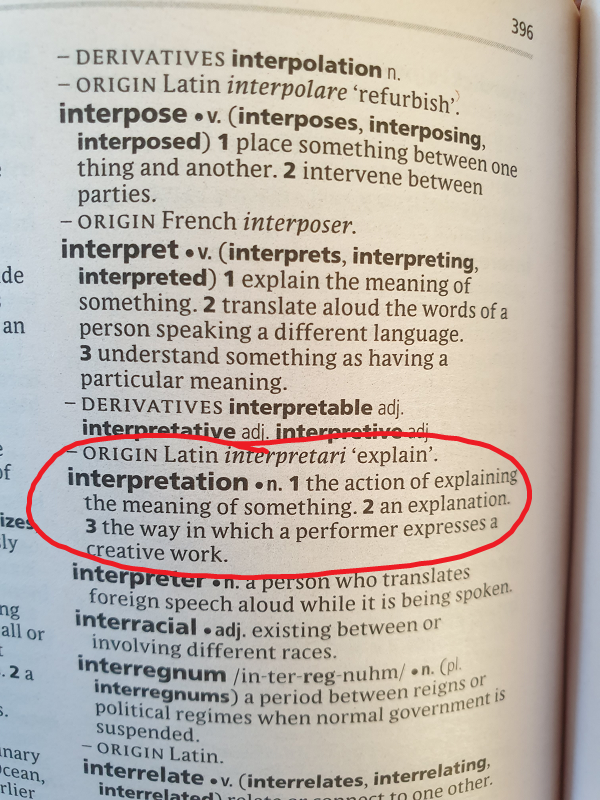
First things first: what do people actually mean when they say “It’s all just a matter of interpretation”?
Note that we can ask this question precisely because it’s not all just a matter of interpretation. We presume that they have a particular meaning in mind. This is how language works. This is why we can look the word “interpretation” up in the dictionary, and the dictionary doesn’t just say “Meh, pick your own definition, I’m busy canoodling with this thesaurus.”
So what do people mean by saying this? Well, I often hear it followed up with this line:
“You can make the Bible say anything you want it to say.”
In other words, the Bible is open to interpretation – it’s ambiguous, so you have to choose your own explanation. Whatever suits you, really.
Is this right? Well, blatantly not, but let’s make this a bit more interesting, by introducing some graphs. Because graphs make everything more fun.
In this case, we’re going to draw a parallel between interpreting words and interpreting data. It might make things clearer. Or not. But it will make things more graphy.
So let’s think for a moment about communication. We start with the real thing. This is the idea, or the truth, that we wish to communicate. Here’s Bob’s:

This is currently only in Bob’s head, but he wishes to communicate this idea to other people. He can’t simply take this idea, in all its wavy beauty, and transplant it directly into another person’s head. Instead, it has to be transformed – firstly into words, which can be passed around to other people. Then those words have to be transformed back into the idea – this is what happens (or should happen) when people read the words. This is how communication between people works. (It’s not a perfect analogy for how God communicates – his words are special – but it’s still a useful way of looking at things.)
When turning the idea into words, Bob can be as precise or as imprecise as he likes. He could say “Hey everyone, let’s improve the restrooms”. This leaves a lot of room for interpretation. Or he could write a ten page memo detailing exactly what he wants to do. Being Bob, of course, that’s what he goes for, and it looks like this:

The act of interpreting this data is basically an attempt to fit a line to these points – this is how we reconstruct the original idea. Now, you could try to interpret this some other way…

…but that’s just being silly. There’s really only one valid interpretation of this data, and it’s exactly what Bob wanted to communicate:

At this point, coming up with some other interpretation requires ignoring what Bob has said.
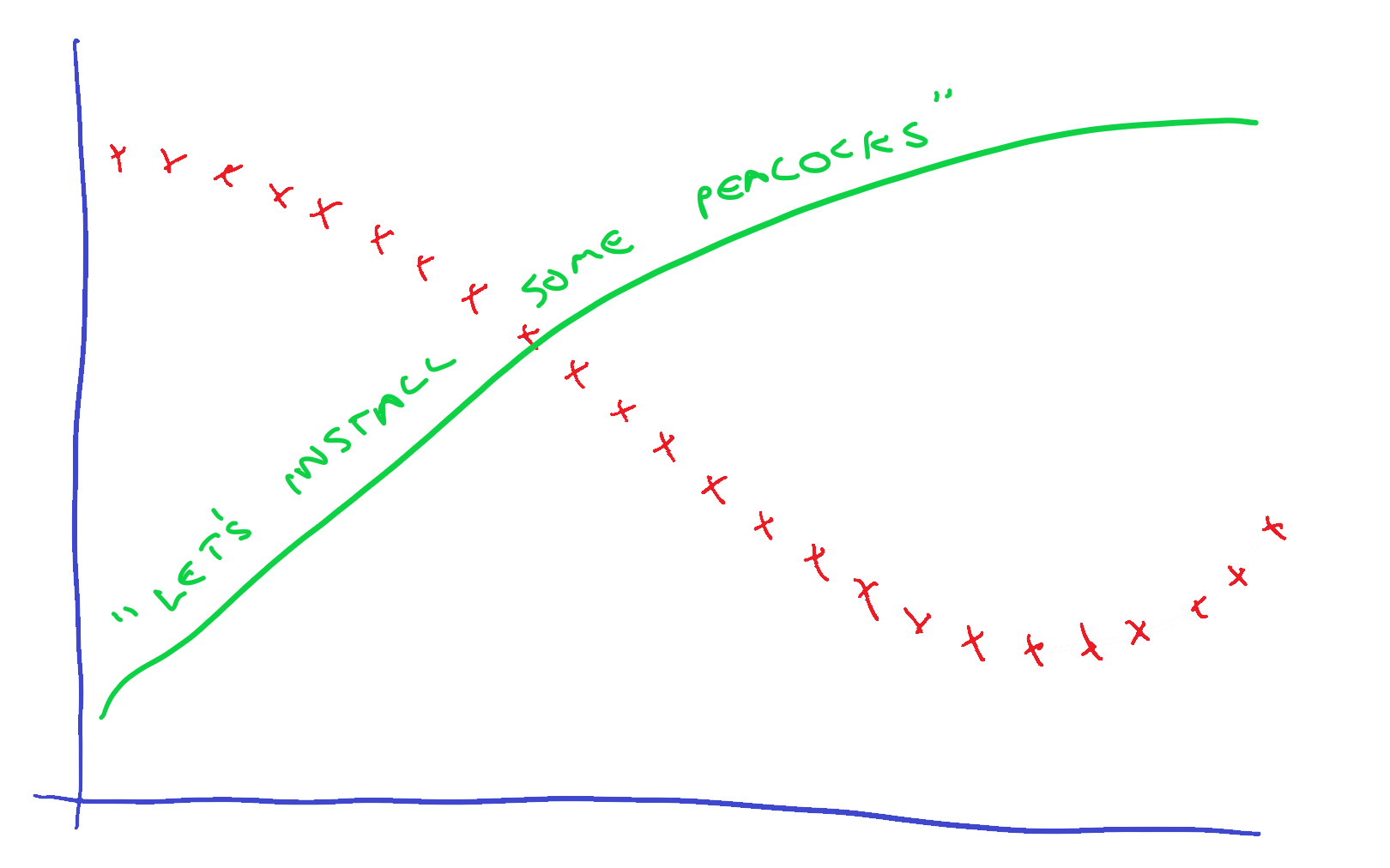
Once you are ignoring Bob’s words anyway, you can, of course, come up with anything, and – since you are ignoring Bob’s words – you have no right to say who is, well, right. Every interpretation is equally valid:
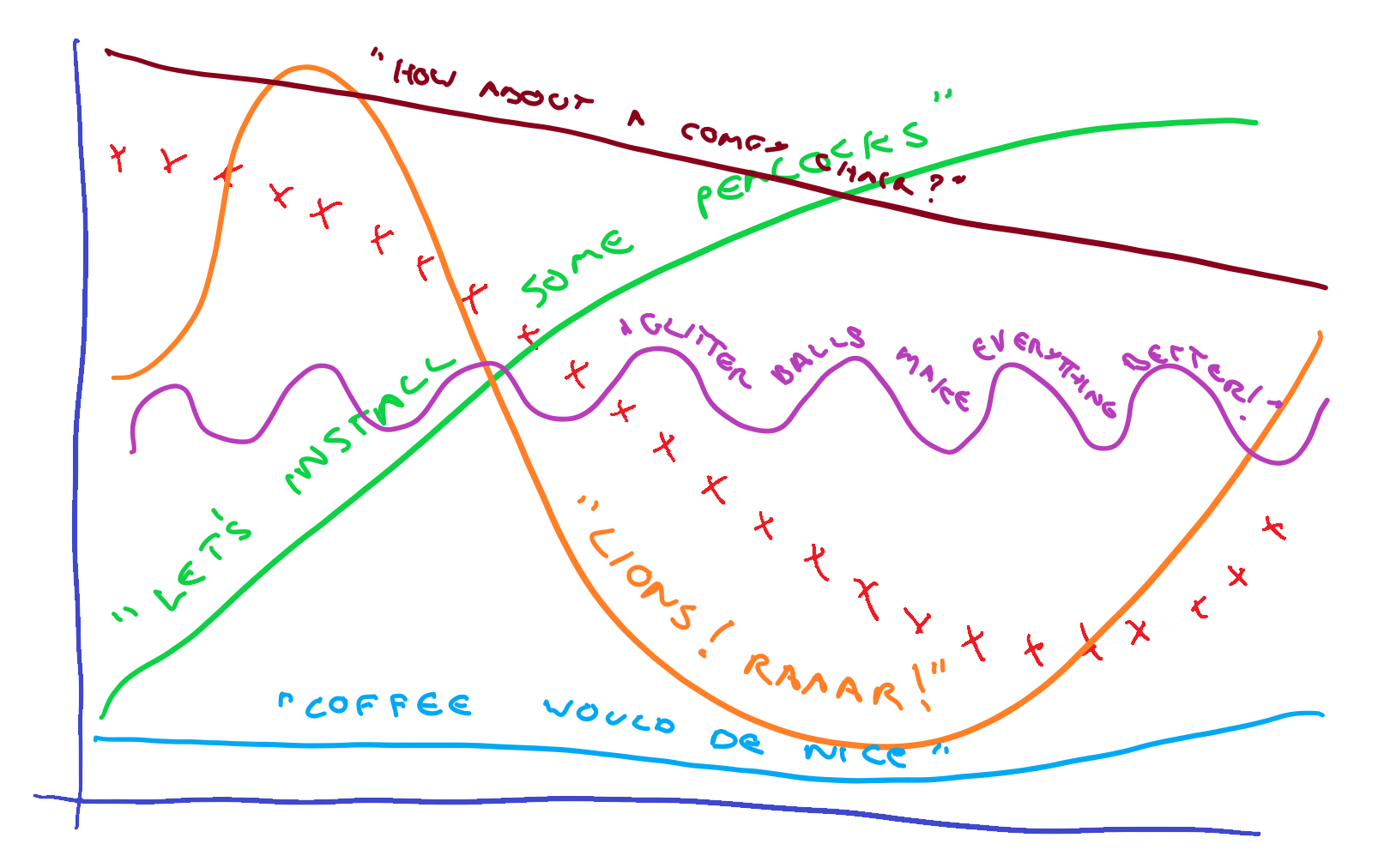
The extreme version of this denies the existence of the original idea. It says “Hey, there was no original meaning in these funny red crosses – we have to find our own meaning.”

And that’s, roughly speaking, what’s going on when someone says “You can make the Bible say anything you want it to say.” It’s just not true. To make that claim, you have to ignore a lot of little red crosses. The Bible is as carefully worded as any BobCorp memo. Infinitely more so, in fact.

Part II: Are bits of the Bible ambiguous?
Okay, so, are there any bits of the Bible that are open to interpretation? Or is it all tightly plotted like the above?
Firstly, let’s state something obvious, which tends to get lost nonetheless: ambiguity doesn’t trump clarity. Or, to put it in English, finding something that’s ambiguous doesn’t give you licence to ignore what’s clear. In Bob terms, just because one sentence in the memo was open to interpretation (“The situation in our restrooms needs to be improved”), you can’t jump straight to peacocks and ignore the very clear explanation in the rest of the memo.


This mistake is where the “all” comes from, in “It’s all just a matter of interpretation”. It’s a terrible error. Don’t dismiss the very real, intelligible and unambiguous claims of scripture just because you’ve heard two different angles on a weird bit of Revelation. (Don’t dismiss the weird bits of Revelation either, but that’s the next point.)
You don’t get to throw out what’s clear just because you found something else that’s unclear.
Right, so, much of the Bible is perfectly clear, but what should we do if we come across a bit that isn’t? In graph form, what if we find ourselves facing this sort of situation:

With only a few points of data, we can draw pretty much any conclusion we like:

As explanations of the data go, the four graphs above are all equally valid. They all fit the data perfectly (allowing for wobbly penmanship). If that was our end goal, then there is no problem here. But our aim isn’t to find a line – our aim is to find the line. Remember, we’re working on the assumption that the author was trying to say something – in other words, before there were two little points on a graph, there was an idea that gave rise to those two little points. We’re trying to reconstruct that idea.
It matters, because – in Bible reading, just as in data science (which is sort of what we’ve been doing here) – fitting a graph to the points is a means, not an end. We find our wiggly line, and then we use it for something. It tells us something. It might lead us to take a particular action. And we want to take the right action.

Our aim isn’t to find a line – our aim is to find the line.
So how do we find the line – what the author was trying to say – if we only have two ambiguous little points of data? There’s only one answer: we need more data. How do we get more data?
By listening. Simply listen. (Good name for a blog, right?)
Most of the time, when the Bible seems ambiguous, it’s because we haven’t done enough listening.
Let’s do a little case-study. Not with a weird bit of Revelation – this post is already long enough, and there are limits to my graph-drawing abilities… Instead we’ll look at a short passage from 1 Kings – mainly because the question of how to interpret this passage actually came up in conversation once with a friend – it’s a real-life example.
The passage in question is 1 Kings 2:13-25. You can read it in full here – for now, I’ll just reduce it to the two-point executive summary:
Scene 1: (v13) Then Adonijah the son of Haggith came to Bathsheba the mother of Solomon... (v17) And he said, “Please ask King Solomon — he will not refuse you — to give me Abishag the Shunammite as my wife.”
Scene 2: (v19) So Bathsheba went to King Solomon to speak to him on behalf of Adonijah... (v23) Then King Solomon swore by the Lord, saying, “God do so to me and more also if this word does not cost Adonijah his life!” ... (v25) So King Solomon sent Benaiah the son of Jehoiada, and he struck him down, and he died.
Here are our two points on a graph:
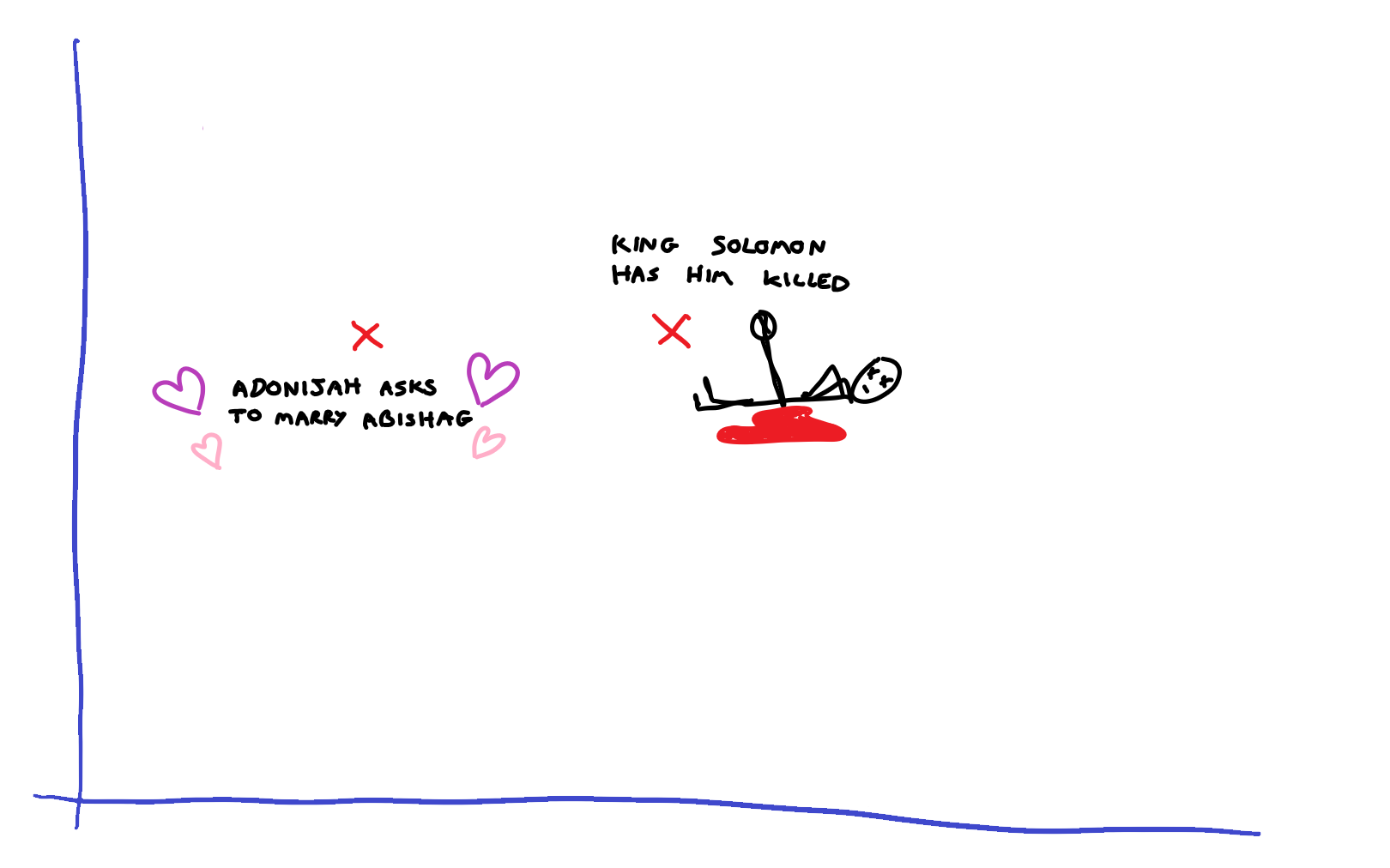
And here’s the obvious interpretation:
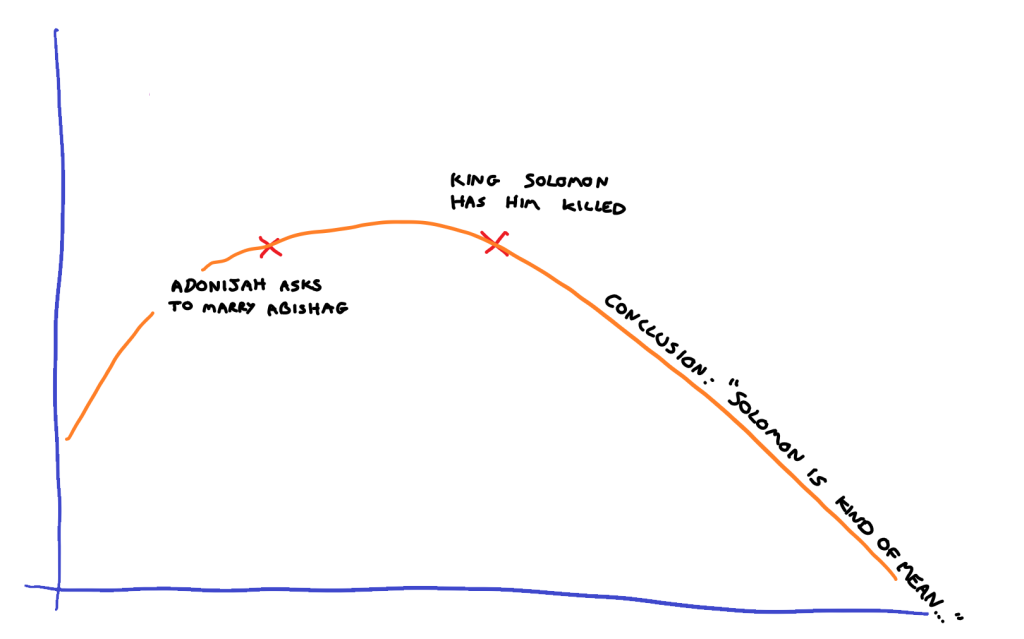
Conclusion: Solomon is mean, Adonijah is innocent, life isn’t fair. Quite how that applies to us now is a little tricky to see… If you like, you can use it as cold comfort when you don’t get what you want – something like: “Hmm, I just got my head bitten off for making a perfectly reasonable request… ah well, at least I’m in good company, it happened to Adonijah too. I’m a righteous martyr like him.”
Or here’s another interpretation, which fits the data equally well:
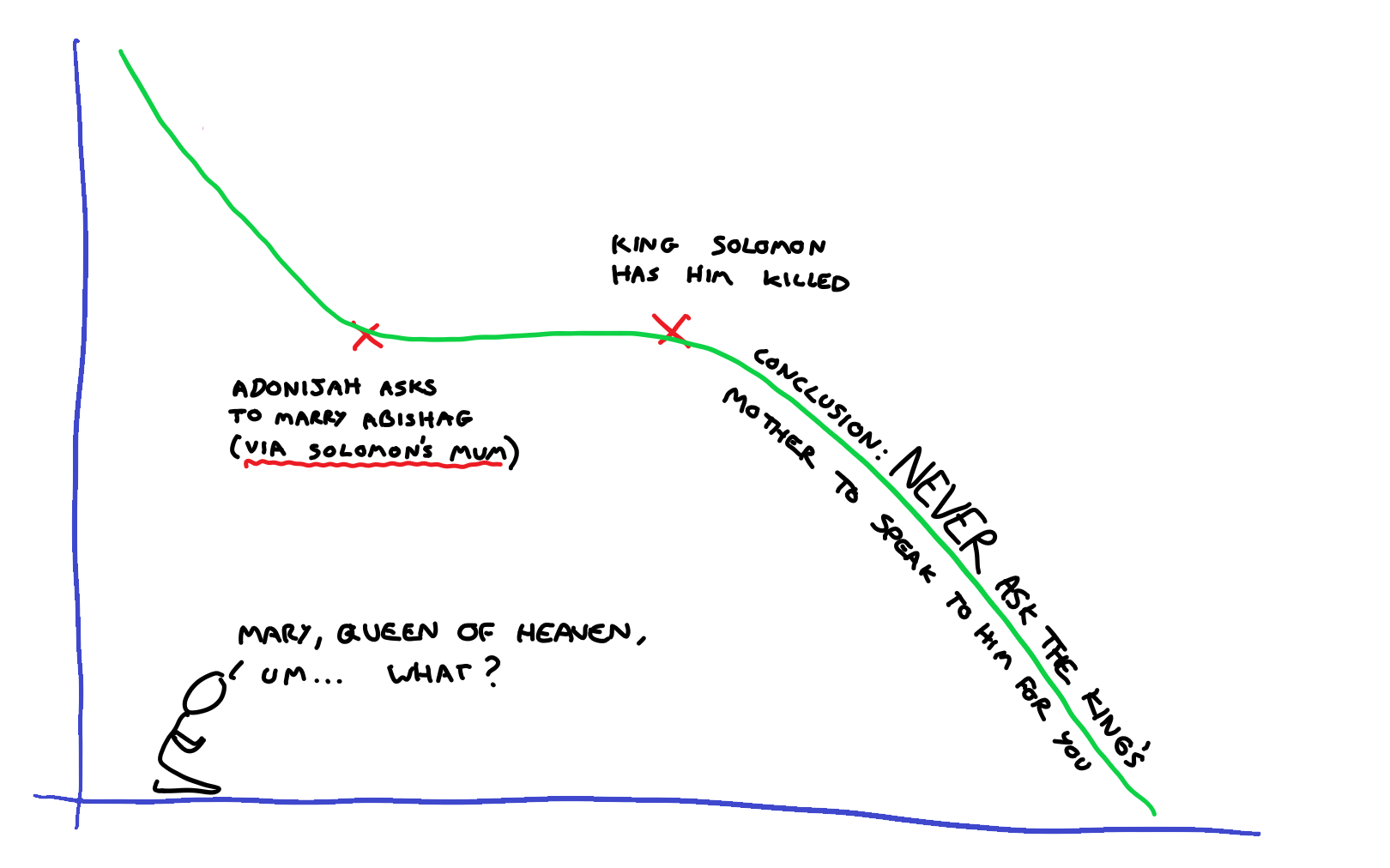
I’m pretty sure both these interpretations are wrong – but they fit the data so far. So, before the Pope comes at me with his papal scimitar, let’s get more data!
First off, who are all these people? Well, in a nutshell:
- Adonijah: King David’s fourth son (see 2 Samuel 3:4) – worth noting that by this point, Amnon the first-born has been murdered by Absalom the third-born (see 2 Samuel 13), and Absalom has in turn been murdered by Joab, the leader of the army (2 Samuel 18). The second-born never gets mentioned, who knows what became of him, so there’s a possibility that Adonijah is the next in line to the throne, according to birth order.
- Bathsheba: One of King David’s wives. Fond of bathing on the roof. No need to go into all that here, really, except that she bore David a son called…
- Solomon: Famous for being the wisest man who has ever lived (though we haven’t yet had the scene where God grants him incredible wisdom).
- Abishag: 1 Kings 1:1-4 tells us all we know about Abishag – essentially, her job was to keep the very old King David warm: “Now King David was old and advanced in years. And although they covered him with clothes, he could not get warm. Therefore his servants said to him, ‘Let a young woman be sought for my lord the king, and let her wait on the king and be in his service. Let her lie in your arms, that my lord the king may be warm.'” So they found Abishag: “The young woman was very beautiful, and she was of service to the king and attended to him, but the king knew her not.”
So far, this doesn’t help us loads, although there is a faint resonance here with something that happened earlier in David’s reign – when Absalom (Adonijah’s big brother) tried to steal the throne from David. (Yes, David’s life was pretty dramatic.) Part of his power play involved publicly sleeping with David’s concubines (2 Samuel 16:21-23). Seen in that light, Adonijah’s request to marry David’s last, prettiest servant girl seems less of a romantic young-love thing, and more of a political maneuvering thing…
We’ll add this to the graph but with some error bars, because it’s not a conclusive argument.
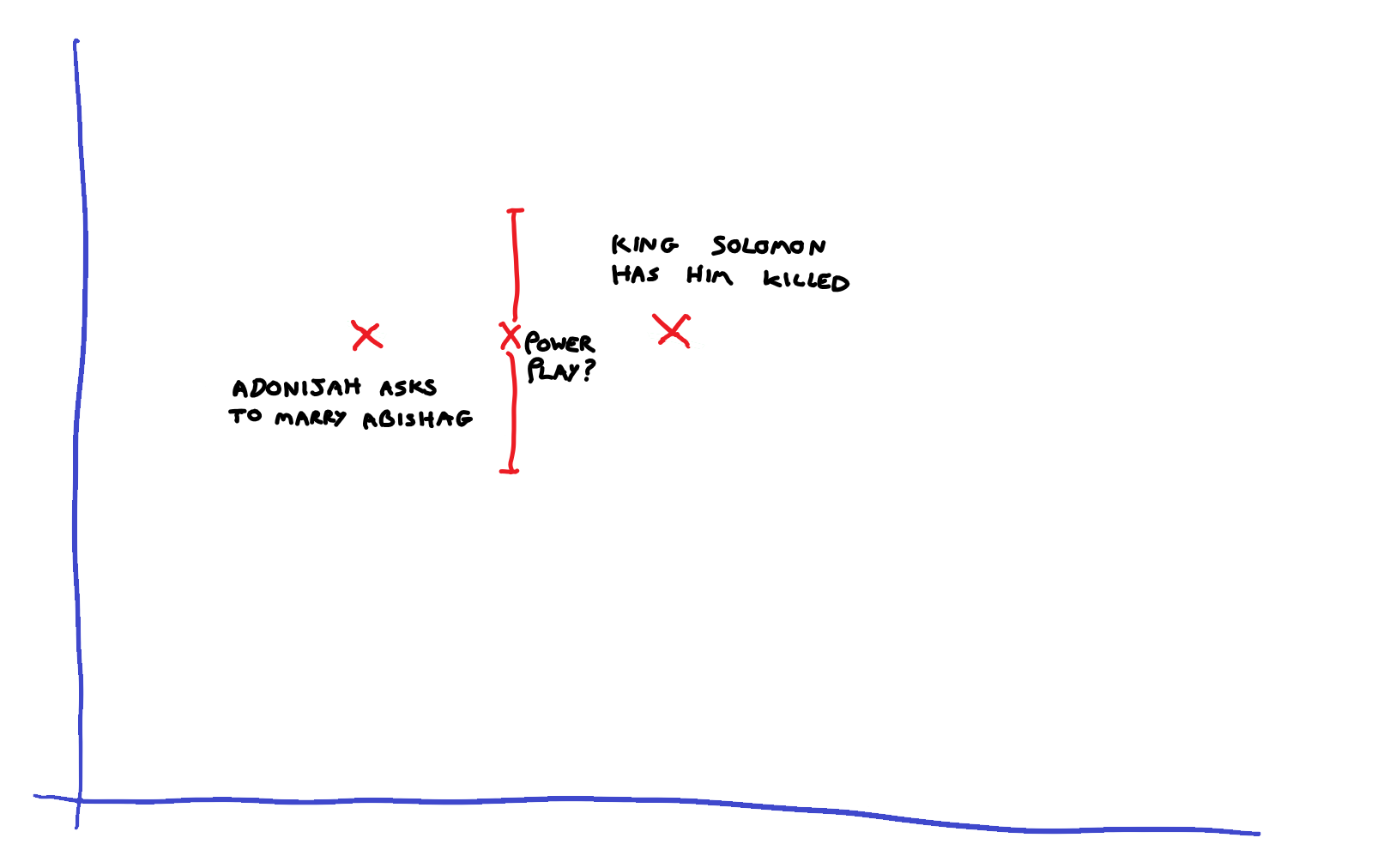
What is pretty damning, however, is the story which immediately precedes our episode. Take a look at 1 Kings 1:15:
Now Adonijah the son of Haggith exalted himself, saying, “I will be king.”
This attempt to take the throne (like Absolom’s attempt) takes place while King David is still alive. He gets quite far with it too, declaring himself King and having a mighty feast with “all his brothers, the king’s sons, and all the royal officials of Judah, but he did not invite Nathan the prophet or Benaiah or the mighty men or Solomon his brother.” (1 Kings 1:9-10)
Why did he not invite Solomon? Probably because Solomon was meant to be King. Three times in this chapter we’re told that David has sworn to the Lord that “Solomon your son shall reign after me, and he shall sit on my throne in my place” (1 Kings 1:13, 17, 30). This is clearly a bit awkward for Adonijah… if he wants to take the throne, he’ll have to deal with Solomon somehow – and twice it’s implied that Solomon (and his mother) will be killed as part of Adonijah’s plans to establish his rule (1 Kings 1:12, 21).
So: Solomon is meant to be the next king of Israel, and Adonijah is attempting to take the throne from him, which will quite possibly involve having him killed. I’m going to suggest that this doesn’t fit particularly well with the “Adonijah is an innocent victim” interpretation we came up with earlier…
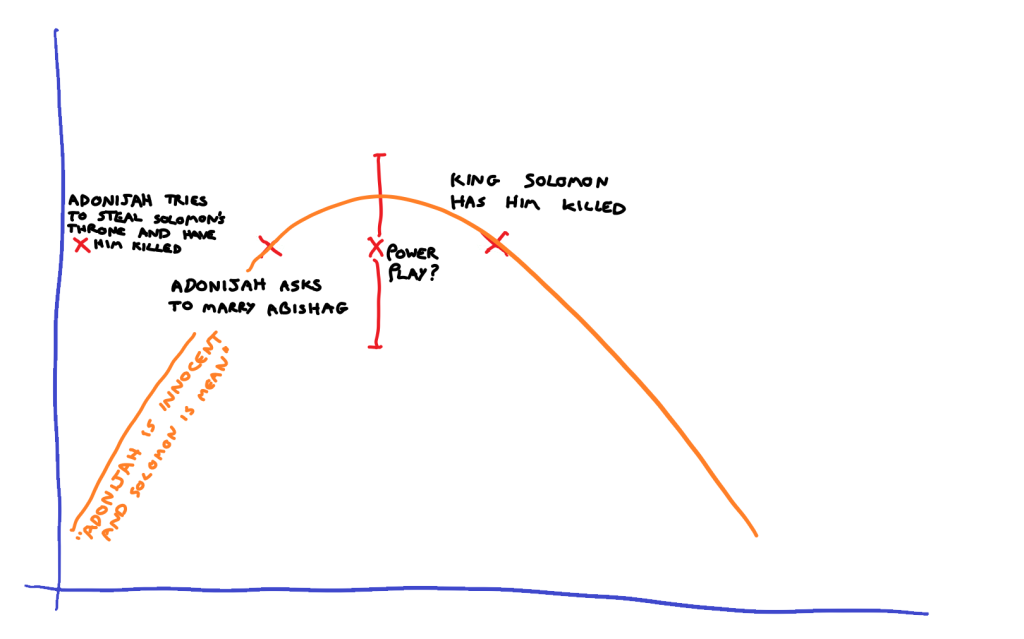
Of course, Adonijah’s plan fails – David gets to hear about it, and he hastily has Solomon crowned king. Adonijah’s supporters flee in panic, and Adonijah himself ends up hiding out in the temple, begging for mercy. Here is Solomon’s response:
Then it was told Solomon, “Behold, Adonijah fears King Solomon, for behold, he has laid hold of the horns of the altar, saying, ‘Let King Solomon swear to me first that he will not put his servant to death with the sword.’” And Solomon said, “If he will show himself a worthy man, not one of his hairs shall fall to the earth, but if wickedness is found in him, he shall die.” So King Solomon sent, and they brought him down from the altar. And he came and paid homage to King Solomon, and Solomon said to him, “Go to your house.”
1 Kings 1:51-53
Solomon’s reply is merciful, but with a warning – it’s essentially “I’ll let you off this time, but misbehave and you will die.” And so Adonijah has a choice – accept the status quo, submit to Solomon as king, and be good… or rebel against his king and face judgement.
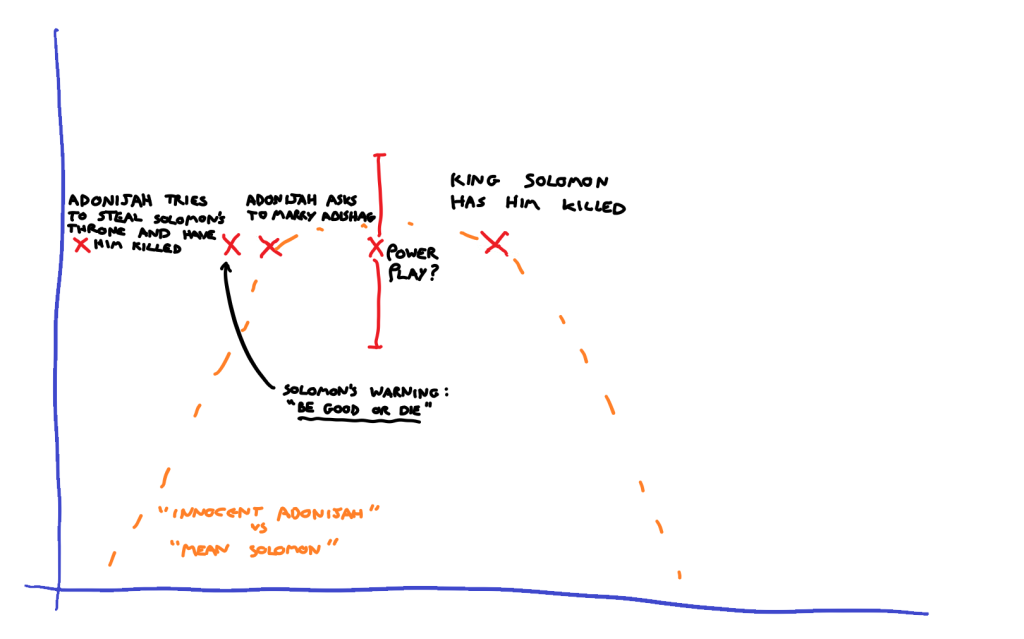
By now, the whole “Innocent Adonijah vs Mean Solomon” interpretation is looking extremely ill-fitting. There’s a much simpler interpretation presenting itself – you really just have to join the dots…
Let’s add in a few final pieces of data. Immediately after Solomon gives Adonijah his choice, we get King David’s final words to Solomon, his son. It includes a bit of, ah, housekeeping – a list of the King’s enemies that David himself didn’t deal with, but that Solomon needs to sort out. For example, of Joab (commander of the armies), David says “Act therefore according to your wisdom, but do not let his grey head go down to Sheol in peace.” (1 Kings 2:6) In other words, says David, he deserves the death penalty for his crimes.
David then dies, and we’re told this: “So Solomon sat on the throne of David his father, and his kingdom was firmly established.” (1 Kings 2:12)
Immediately after that, we get the episode where Adonijah tries to acquire Abishag, and immediately after that, Solomon goes on a little killing spree – first Adonijah, then King David’s enemies (including Joab, who had signed his own death warrant during David’s reign, and then signed it all over again by supporting Adonijah against Solomon).
The Bible’s final word on this small catalogue of killing?
So the kingdom was established in the hand of Solomon.
1 Kings 2:46
Do you see the structure?
- Solomon is given a list of “enemies of the crown”…
- David dies – Solomon’s “kingdom was firmly established.”
- Enemies of the crown destroyed
- “So the kingdom was established in the hand of Solomon.”
It’s in part 3 that Adonijah makes his request and meets his doom – in that context, it’s hard to think of him as an innocent subject who just wanted to marry a pretty girl.
By the way, all this death may sound unpalatable to our modern sensibilities, but what we’ve just seen is a good thing – keep in mind that Solomon (who is later described as the wisest man ever to have lived) is a great king – his reign is considered the absolute high-point of Israel’s history. As he takes up his throne, he brings about absolute justice, righting past wrongs, destroying those who want to topple his rule, and firmly establishing the kingdom – something that means safety and prosperity for his people.
Here’s a final plot:
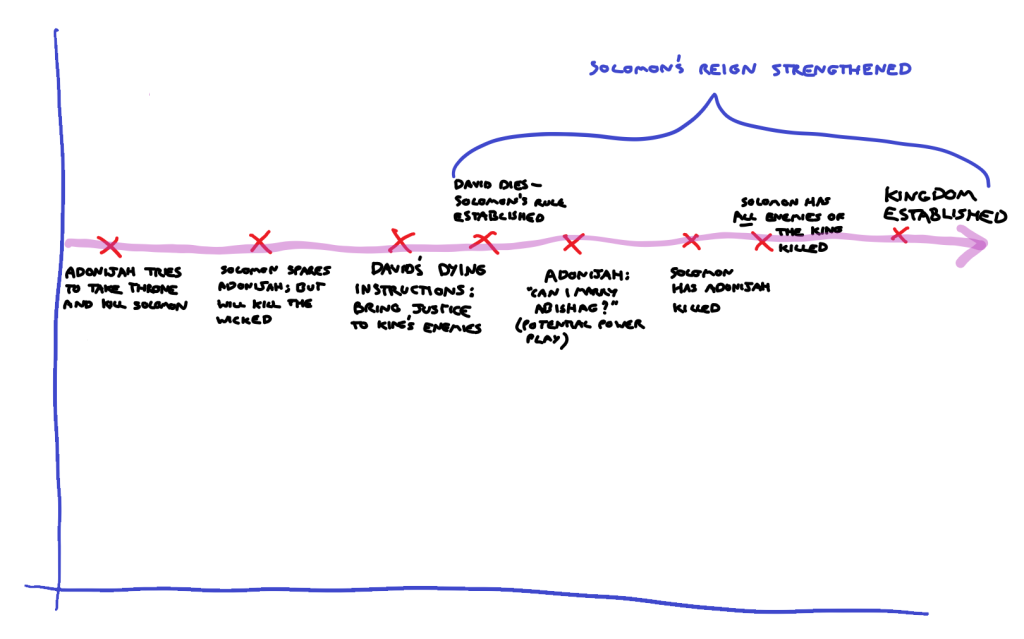
To summarise, then:
Coming, as it does, after an unsuccessful attempt to steal the throne, and in the context of a period where Solomon is establishing his authority over all enemies of the crown, it’s almost impossible to view Adonijah’s marriage plans as innocent. This passage isn’t simply a matter of interpretation. We’ve found a line, and we can be fairly sure that it was the line – that we’ve recovered the truth.
Note: we said earlier that we'd want to do something with the line once we'd found it - that finding the line was not the end goal, but the means. In this case, the straight line we've arrived at has some major implications for anyone who wants to stand against God's chosen king. It's a straight line that we can extend all the way to the establishment of King Jesus's rule... But in this post we're just making a point about interpretation. Thinking through where this line leads is left as an exercise for the reader.
Back on the subject of interpretation, what I really want us to know is that we’ve not done anything magical here. All we did was read the text (1 Kings, chapters 1 and 2) and gather the data. It’s just listening. We didn’t need a theology degree, or an enormous sack of Biblical knowledge, we just listened.
Okay? Nearly done.
Part III: Is any of the Bible ambiguous?
Right, so, we took a passage that seemed ambiguous, we looked deeper and gathered more data, and we discovered that, after all, the passage wasn’t really open to interpretation. But are there ever cases in the Bible where there simply is no more data? Does that ever happen?
Yes.

What then? Well, you’ve got two options. Option one: you could go mad trying to form an interpretation on next to no data, hunting desperately to find extra data where there is none, and arguing with people who have tried to do the same thing but understandably ended up drawing different conclusions. You could write books on your findings, arguing with their books. If that’s what you enjoy, go ahead.
Option two: you could assume that the “missing” data is missing precisely because it’s unnecessary. For example, scour the wee sketch at the top of this post – read it over and over – you will never learn the colour of Mr Fawning-Goatee’s tie. Why? Because I didn’t tell you. I didn’t tell you, because it was utterly irrelevant to the point I was trying to make. (But if you really want to know, it’s mustard yellow.) Similarly, the Bible tells us what we need to know – not always what we want to know.
And, in the end, if something seems ambiguous, try zooming out a bit. Look at the big picture. Because the big picture of the Bible is perfectly clear.

So there it is. What have we learned?
Is the Bible “all just a matter of interpretation”? No.
Are there some bits that seem ambiguous? Yes, but:
- That doesn’t give us leave to ignore the clarity in the rest of scripture.
- Some bits are only ambiguous because we haven’t listened carefully enough yet.
- Where there’s no clarifying data to be found anywhere, we’re probably asking a question we don’t really need the answer to.
- Even if a detail is unclear, the big picture is perfectly clear. (And it’s all about Jesus.)
And graphs can be fun.
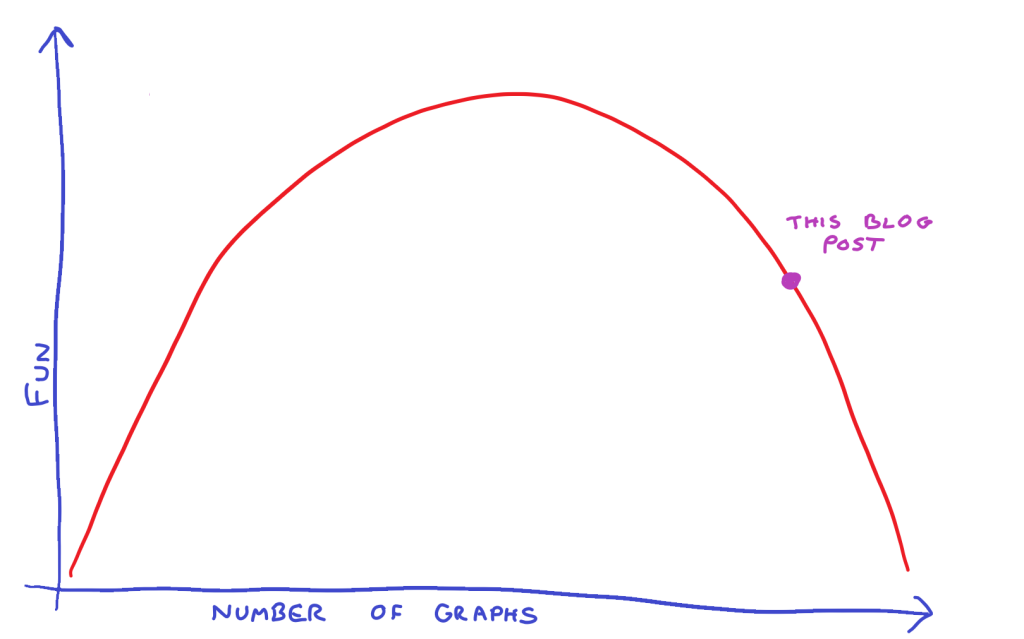
I’m glad I’m not the only one who’s noticed – and been irritated by – the annoying over-use of “yourself” in corporate lingo. Thank yourself for drawing other people’s selves’ attention to it.
LikeLike